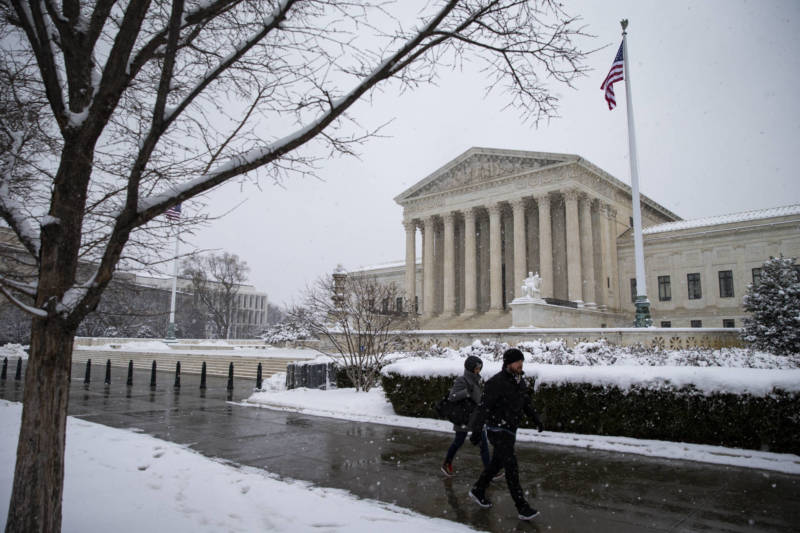The transgender ban is being revived more than a year after a federal court in Washington, D.C., first blocked it in October 2017. U.S. District Judge Colleen Kollar-Kotelly ruled that trans members of the military had "a strong case that the president's ban would violate their Fifth Amendment rights," as NPR reported.
A three-judge panel of the U.S. Court of Appeals for the District of Columbia Circuit lifted Kollar-Kotelly's injunction earlier this month, concluding that the ban had been substantially revised by the time it was instituted by former Defense Secretary Jim Mattis in March 2018. But other federal courts had also ruled against the ban — and until Tuesday, those other injunctions remained in place.
The two outstanding cases come from California and Washington state, in the 9th Circuit's jurisdiction.
The Human Rights Campaign, which is involved in the Karnoski case in Washington state, condemned the Supreme Court's decision, saying it "thrusts this administration's discriminatory agenda onto a military that clearly doesn't want it, and does so at the expense of transgender people's careers and service."
Shannon Minter, legal director of the San Francisco-based National Center for Lesbian Rights, one of the organizations representing plaintiffs in cases challenging the ban, called the court's decision a "very sad day for our military, for transgender people in this country, certainly for the thousands of courageous dedicated transgender service members who were willing to make the ultimate sacrifice to protect our country."
“It is definitely a body blow and a very traumatic moment for them to know that the United States Supreme Court has, however temporarily, allowed the Trump administration to enforce a ban that directly attacks them and falsely paints them as unfit for military service, even as they are every single day proving their fitness to serve,” Minter said in an interview with KQED.
While Minter was disappointed by the decision to grant the stay, he was encouraged that the Supreme Court is allowing the cases to proceed through the district courts.
"This is a temporary order," Minter said. "It theoretically does allow the government now to enforce the ban while we all wait for the 9th Circuit to rule, which is going to happen any day now."
Sen. Dianne Feinstein, D-California, called the Supreme Court’s decision to allow Trump’s transgender ban to temporarily take effect "deeply disappointing" and “creates unnecessary confusion for transgender individuals serving in the military.”
“The ban would essentially restore ‘Don’t Ask, Don’t Tell’ for transgender service members, only allowing them to serve if they hide their true identity,” Feinstein said in written statement. “That previous policy directed toward LGBT service members harmed our military then, just as this one will now.”
Trump announced his ban abruptly in the summer of 2017, saying in a series of tweets that "the United States Government will not accept or allow...... ....Transgender individuals to serve in any capacity in the U.S. Military."
The decision seemed to take Defense Department officials by surprise, sparking confusion despite Trump's assertion that he had consulted "with my Generals and military experts."
The tweets were followed by an official presidential memo in August of that year, which gave the defense secretary (and for the Coast Guard, the Homeland Security secretary) the discretion to "determine how to address transgender individuals currently serving in the United States military."
Trump's ban was a sharp reversal of a Pentagon policy announced in June 2016, when former Defense Secretary Ash Carter said, "Effective immediately, transgender Americans may serve openly, and they can no longer be discharged or otherwise separated from the military just for being transgender."
That Obama-era policy was hailed as ending an era of legal and professional limbo for trans people in the U.S. armed service; Carter said the decision was made out of a desire to attract "all talent possible" to serve in the military.
At the time, researchers at the RAND Corporation think tank estimated there were as many as 7,000 active-duty transgender service members, with up to 4,000 more in the reserves.
Because of that policy and the lower-court injunctions, the first openly trans people were officially able to join the U.S. military on Jan. 1, 2018. But now their status is once again in jeopardy.
Tuesday's order states that if the 9th Circuit rules against the ban, the ban on trans people in the military would remain in effect until the Supreme Court justices either deny a request to hear the case (if such an application is made) or rule against the Trump administration's policy.
NPR's Domenico Montanaro and KQED's Ted Goldberg contributed to this report.
Copyright 2019 NPR. To see more, visit https://www.npr.org.
